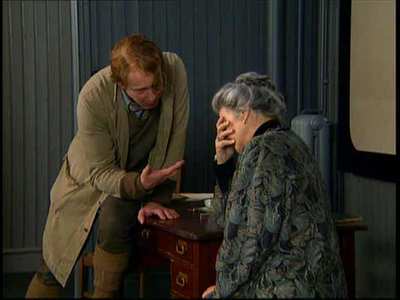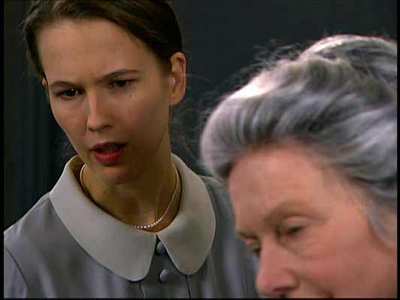Review of Phantom Carriage, The / The Image Makers
Introduction
THE PHANTOM CARRIAGE
Expressionism is most associated with German cinema, with films like `The Cabinet of Dr. Caligari`, `Nosferatu` and `Metropolis`, but it was also to be found in central Europe and Scandinavia. Amongst the lesser known expressionist films is `The Phantom Carriage` by the Swedish director Victor Sjöström.
The film starts on New Year`s Eve, where a Salvation Army Sister is on her death bed. She asks for David Holm and, after some deliberation, her friends decide to look for him. The reticence of her friends is well-founded, as he is a drunk in a graveyard, telling his companions the legend that the last person to die on this date will be cursed to drive the Phantom Carriage and collect the souls of the dead for a year. After an altercation, following his refusal to see the Sister, he is attacked and killed on the stroke of midnight. His assailants look at the clock in horror as they realise the fate that befalls their victim.
His soul is met by the spectral carriage and its driver, who shows him the effect his drinking and destructive behaviour has had on his family and friends.
THE IMAGE MAKERS
This adaptation of a stage play of the same name by Per Olov Enquist takes place in the Swedish Film Studios, where Victor Sjöström has nearly finished `The Phantom Carriage`, which he shot with photographer Julius Jaenzon. Selma Lagerlöf, who wrote the screenplay from her own book, is invited to watch some scenes from the film. Her arrival sparks tensions between Lagerlöf and actress Tora Teje about the characters and themes of the book, causing much anguish and soul-searching.
Made for Swedish TV in 2000 by Ingmar Bergman, reportedly a great admirer of Sjöström and `The Phantom Carriage`, this was the great man`s penultimate film and is basically a filmed stage play or, as Bergman called it, `TV theatre`.
Although they are very different, `The Image Makers` reminded me of `Shadow of The Vampire`, as both are contemporary films that revisit the making of a classic horror film of the silent era.

Video
THE PHANTOM CARRIAGE
As you would expect from a 90 year old film, the image is a little shaky and of variable quality. This is not, however, to the detriment of the movie, as this is part of its charm and appeal. The groundbreaking ghost effects are still effective and were a marvellous technical achievement for filmmaking in 1920. This version has colour tints to accentuate the other-worldly nature of the film.
THE IMAGE MAKERS
Broadcast quality from 2000, which is to say that the fullscreen picture is of a high standard, with colouring and costumes appropriate for the year in which the events are portrayed.

Audio
THE PHANTOM CARRIAGE
The 2-channel PCM mono soundtrack is very clear, presenting the musical score well.
The Swedish intertitles are well subtitled in English; there is no option to have them or not on the main menu, but was able to turn them off with the remote.
THE IMAGE MAKERS
A clear Dolby Digital 2.0 Stereo soundtrack with well defined dialogue and excellent English subtitles which are on by default, but can be turned off with the remote.

Features
There are three trailers for the KTL edition of `The Phantom Carriage` on that disc, nothing on the other and the retail set apparently comes with a 4-page booklet with film notes by David Thompson.

Conclusion
Considered a horror film at the time, `The Phantom Carriage` must have been a disturbing film to watch in 1920, with spirits rising from their bodies and the Grim Reaper and his ghostly stagecoach. Nowadays, audiences are used to graphic violence, gore and surround sound, so few will find the film in any way scary. It remains a masterpiece of filmmaking and an interesting watch, not just because of the technical achievements, but because of the involving story, haunting atmosphere and fine acting by director Victor Sjöström, who also plays David Holm.
`The Image Makers` is a powerful film, with superb performances by Anita Björk, who dominates every scene, but receives excellent support by the three main actors, with Elin Klinga matching her almost all the way playing the actress Tora Teje. I didn`t realise that Ingmar Bergman had done so much TV work but it`s no wonder if his work on the small screen was of this quality.
These niche films are clearly not going to be to everyone`s taste and are obviously not aimed at a mass market. I enjoyed them, but then I`d watch Murnau`s `Nosferatu` as entertainment! Fans of Bergman, or those interested in early filmmaking, should definitely check this set out. If you are only interested in `The Phantom Carriage`, Victor Sjöström`s masterpiece is also available as a separate release.
Your Opinions and Comments
Be the first to post a comment!